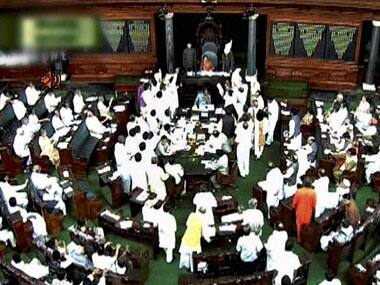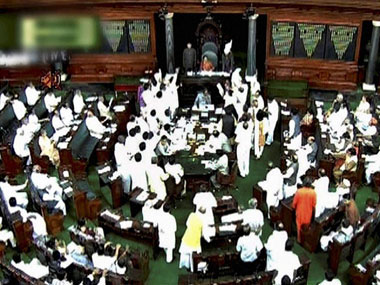The Lokpal Bill survived a near-death experience in the Lok Sabha, but its passage in the Rajya Sabha is in grave danger. For today, the focus will be on the numbers game in parliament, but even beyond the drama of the moment, the Lokpal institution that the Bill envisages stands on such slippery ground that all this sound and fury, and the frenetic back-room deals that are being struck, may eventually end up in empty nothing. First, the numbers in the Rajya Sabha. The UPA doesn’t have a majority in the Upper House: in the 243-member chamber, it has only 95 MPs, the BJP and its allies have 66; the Left parties together account for 19; and the rest are shared among an array of parties, with the BSP accounting for the largest share of 18 seats. (Details of the break-up
here
.) To advance their respective cause, both sides – the ruling coalition and the Opposition - are working on the smaller parties and splinter groups. [caption id=“attachment_167207” align=“alignleft” width=“380” caption=“Even if the Lokpal Bill clears the Rajya Sabha hurdel, its fate is uncertain. PTI”]
 [/caption] For the UPA, the situation is rendered more complex by the fact that one of its constituents, the Trinamool Congress, is
throwing a spanner in the works
.
The Indian Express reports
that three Rajya Sabha members of the party have submitted three amendments, all of which revolve around the party’s reluctance to see Lokayuktas set up in the States without the consent of the state governments. Mukul Roy, TMC leader in the Rajya Sabha and minister of state for shipping, is quoted as saying that party wants “the entire portion on Lokayuktas to be omitted from the Bill.” If the amendments don’t come through, he said, “we will have no choice but to press for a division vote.” TMC leader Mamata Banerjee, who is turning out to be the UPA’s most recalcitrant partner, is believed to have told her party leaders in Delhi that the Bill as passed in the Lok Sabha was unacceptable. On the other side, the BJP wants to move amendments to address three of its concerns: like the TMC, it too wants to make Lokayuktas optional at the state level, but it additionally wants amendments to render the CBI somewhat more autonomous, and to widen the selection process of the Lokpal panel. When it comes right down to the crunch, the passage of the Bill may hinge on whether the BSP and the Samajwadi Party will stage a walkout – as they did in the Lok Sabha. The Left parties have evidently asked SP leader Mulayam Singh Yadav to vote against the Bill. The Congress too is believe to be working to secure either the support of the SP and the BSP – or at least to persuade them to stage a strategically timed walkout. Beyond the numbers game, there are other complications that could effectively get the Bill to hang in the trishanku land: neither here nor there. If any amendments are made to the Bill as passed by the Lok Sabha, the bill will have to be sent back for passage again. If the Lok Sabha rejects those amendments, a joint session of Parliament may be required to get the Bill passed. If that too doesn’t get the job done, you may as well kiss the Bill goodbye. Even if by some parliamentary miracle some form of a Lokpal Bill becomes law – and it does look like it will need a miracle – the Lokpal authority that will emerge at the end of it will still be susceptible to arbitrary termination.
The Hindu reports
, quoting legal experts, that without constitutional status for the proposed Lokpal, the institution can be scrapped if it ever proves “inconvenient to any government.” Former Chief Justice of India, Justice VN Khara, cites two instances of Lokayukta laws in Punjab and Haryana that were repealed when the governments resented some “inconvenient questions” posed by the Lokayuktas.In both cases, the state governments issued ordinances effectively scrapping the Lokayuka. Khare additionally makes the point that conferring constitutional status on the Lokpal would have lent the institution greater autonomy and power. The daily quotes another former Chief Justice of India, Justice J.S. Verma, too as saying that even if the current Lokpal Bill becomes law, without the cover that constitutional status would provide, it could be repealed by a simple majority if any future government that resents the scrutiny. (
Read more here
.) Of course, whichever government decides to repeal it will have to deal with the political consequences of such a move, but if there’s anything that the parliamentary atmospherics surrounding the Lokpal teaches us, it is that when it comes to enfeebling and castrating the Lokpal authority, there is near-unanimity among all the parties. In other words, even if even if the Lokpal Bill, which has already been considerably weakened as to render it ineffectual, passes today’s Rajya Sabha test through some back-room deal, the fate of the Lokpal authority that will emerge from it will be on very slippery ground. Why, then, do we bother with all this huffing and puffing?
[/caption] For the UPA, the situation is rendered more complex by the fact that one of its constituents, the Trinamool Congress, is
throwing a spanner in the works
.
The Indian Express reports
that three Rajya Sabha members of the party have submitted three amendments, all of which revolve around the party’s reluctance to see Lokayuktas set up in the States without the consent of the state governments. Mukul Roy, TMC leader in the Rajya Sabha and minister of state for shipping, is quoted as saying that party wants “the entire portion on Lokayuktas to be omitted from the Bill.” If the amendments don’t come through, he said, “we will have no choice but to press for a division vote.” TMC leader Mamata Banerjee, who is turning out to be the UPA’s most recalcitrant partner, is believed to have told her party leaders in Delhi that the Bill as passed in the Lok Sabha was unacceptable. On the other side, the BJP wants to move amendments to address three of its concerns: like the TMC, it too wants to make Lokayuktas optional at the state level, but it additionally wants amendments to render the CBI somewhat more autonomous, and to widen the selection process of the Lokpal panel. When it comes right down to the crunch, the passage of the Bill may hinge on whether the BSP and the Samajwadi Party will stage a walkout – as they did in the Lok Sabha. The Left parties have evidently asked SP leader Mulayam Singh Yadav to vote against the Bill. The Congress too is believe to be working to secure either the support of the SP and the BSP – or at least to persuade them to stage a strategically timed walkout. Beyond the numbers game, there are other complications that could effectively get the Bill to hang in the trishanku land: neither here nor there. If any amendments are made to the Bill as passed by the Lok Sabha, the bill will have to be sent back for passage again. If the Lok Sabha rejects those amendments, a joint session of Parliament may be required to get the Bill passed. If that too doesn’t get the job done, you may as well kiss the Bill goodbye. Even if by some parliamentary miracle some form of a Lokpal Bill becomes law – and it does look like it will need a miracle – the Lokpal authority that will emerge at the end of it will still be susceptible to arbitrary termination.
The Hindu reports
, quoting legal experts, that without constitutional status for the proposed Lokpal, the institution can be scrapped if it ever proves “inconvenient to any government.” Former Chief Justice of India, Justice VN Khara, cites two instances of Lokayukta laws in Punjab and Haryana that were repealed when the governments resented some “inconvenient questions” posed by the Lokayuktas.In both cases, the state governments issued ordinances effectively scrapping the Lokayuka. Khare additionally makes the point that conferring constitutional status on the Lokpal would have lent the institution greater autonomy and power. The daily quotes another former Chief Justice of India, Justice J.S. Verma, too as saying that even if the current Lokpal Bill becomes law, without the cover that constitutional status would provide, it could be repealed by a simple majority if any future government that resents the scrutiny. (
Read more here
.) Of course, whichever government decides to repeal it will have to deal with the political consequences of such a move, but if there’s anything that the parliamentary atmospherics surrounding the Lokpal teaches us, it is that when it comes to enfeebling and castrating the Lokpal authority, there is near-unanimity among all the parties. In other words, even if even if the Lokpal Bill, which has already been considerably weakened as to render it ineffectual, passes today’s Rajya Sabha test through some back-room deal, the fate of the Lokpal authority that will emerge from it will be on very slippery ground. Why, then, do we bother with all this huffing and puffing?
Sound and fury but empty nothing: Lokpal is a dead duck
FP Politics
• December 29, 2011, 06:21:12 IST
For the Rajya Sabha to pass the Lokpal Bill today will require a miracle - or a shady back-room deal. But even if it becomes law, the Lokpal’s fate appears to be doomed.
Advertisement
)
End of Article